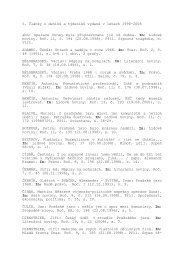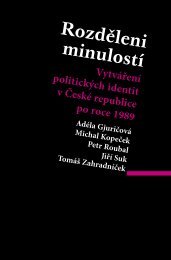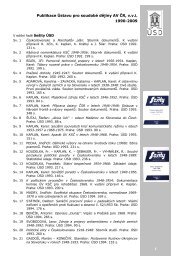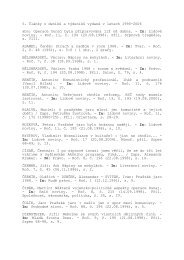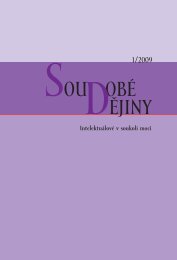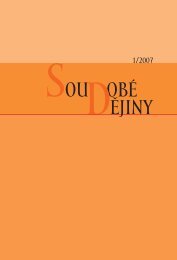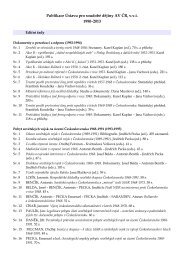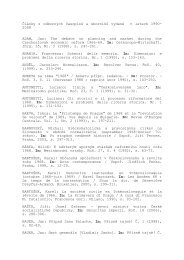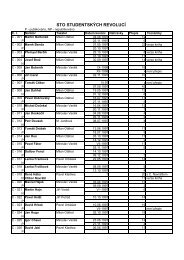SOU OBà ÄJINY - Ãstav pro soudobé dÄjiny AV - Akademie vÄd ÄR
SOU OBà ÄJINY - Ãstav pro soudobé dÄjiny AV - Akademie vÄd ÄR
SOU OBà ÄJINY - Ãstav pro soudobé dÄjiny AV - Akademie vÄd ÄR
You also want an ePaper? Increase the reach of your titles
YUMPU automatically turns print PDFs into web optimized ePapers that Google loves.
Summaries Anotace 525<br />
engineering and automated systems of control and a member of several academic<br />
societies. During the ‘Prague Spring’ he was active in K 231 (or Klub 231, Klub<br />
bývalých politických vězňů, the Association of Former Political Prisoners). In the<br />
mid-1970s, with the help of the former journalist Eugen Vrba (1918–2004), who was<br />
under secret-police surveillance, Dolejší attempted to send academic articles about<br />
Czechoslovakia to the West, for which he would receive payment. In 1976 both men<br />
were arrested. Although the official dossiers did not state clearly whether Dolejší’s<br />
and Vrba’s reports contained sensitive intelligence, the two men were accused of<br />
spying and Vrba was sentenced to ten years in prison, Dolejší to eleven. Dolejší was<br />
released in 1985, twenty months before his sentence would have ended.<br />
The author claims that Dolejší’s analysis, which seeks to explain the events of<br />
November 1989 as a conspiracy of dissidents, Communists, and foreign secret services,<br />
was psychologically determined by the tragic fate of its author and that it is fair to<br />
see it as a particular way of seeking satisfaction for wrongs done. For men imprisoned<br />
in the 1950s, and who had thus been robbed of their futures, it was painful to see<br />
former Communists, albeit signatories of Charter 77, who had in several cases been<br />
involved in their persecution, taking up senior posts in public life. For Dolejší one such<br />
person was Vladimír Kolmistr (born 1930), a member of Obroda (Rebirth), the club<br />
of dissident reform-Communists, and then a member of the Czech Parliament (Czech<br />
National Council) in the 1990s. In 1950, as Chairman of the Kladno District Committee<br />
of the Czech Youth Association (Český svaz mládeže), Kolmistr had instigated Dolejší’s<br />
expulsion from secondary school. Evidence of this is <strong>pro</strong>vided by the minutes of the<br />
meeting about the expulsion, which are also published here with an introduction by<br />
the historian Jaroslav Cuhra, putting them in the broader context.<br />
Discussion<br />
‘So, How Should It Have Been Done’ Pithart’s Questions<br />
and the Civic Forum Historical Committee<br />
Jan Křen and Pavel Seifter<br />
In this contribution, the authors, both historians, but this time as eye-witnesses, ask<br />
the question that Petr Pithart touched upon in his memoirs, Devětaosmdesátý (Eightynine;<br />
2009): What could have been done to prevent the widespread destruction and<br />
theft of secret-police files and other archive records in Czechoslovakia in late 1989<br />
The authors cast doubt on Pithart’s claim that this state of affairs was a result of the<br />
situation in society and that it was impossible to influence it in any fundamental way.<br />
The solution, the authors believe, was offered by the Historical Commission of the<br />
Civic Forum, of which they were members, whose draft <strong>pro</strong>posals for the security<br />
and preservation of archive records, as well as other work from December 1989 and<br />
January 1990, they discuss here. They also discuss why these <strong>pro</strong>posals were not<br />
given a fair hearing in the Coordinating Centre of the Civic Forum.



